Interview: Rose McGowan is out to expose the real Hollywood
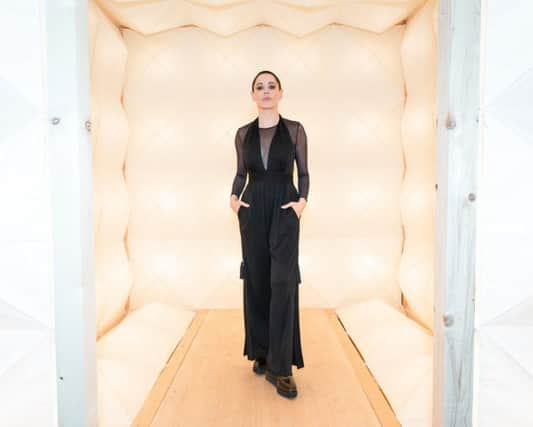

If there’s one word that sums up activist, former actor, director, author, model and singer, Rose McGowan, one of the first to publicly speak out against disgraced movie mogul Harvey Weinstein, now accused of sexual assault and harassment by more than 90 women, it’s ‘brave’. Brave, the title of her memoir and manifesto is a call to arms for us all to wake up to the misogyny of the entertainment industry and beyond, her bid to give voice to the victims of sexism and violence and to join her Rose Army of free thinkers striving to make things better and reclaim their lives.
Set for the Edinburgh International Book Festival, McGowan comes on the phone from London, excited about her appearance and keen to spread the word.
Advertisement
Hide AdRaw and revealing, the book follows McGowan from a childhood growing up in the Children of God cult, to Hollywood and movies, through her relationships with rocker Marilyn Manson and director Robert Rodriguez, through her alleged attack by Weinstein and its aftermath, to her reawakening and speaking out.
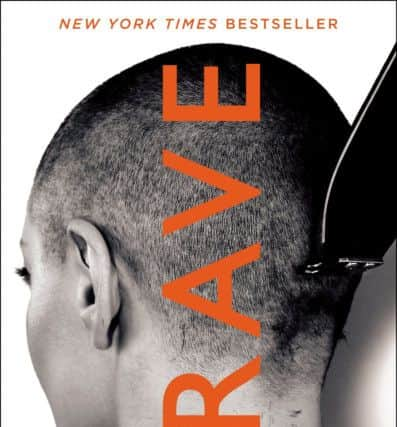

Articulate and intelligent, she responds to questions without equivocation. This Rose is attractive and friendly, yet she has thorns.
“It’s about getting braver in our lives by at least 10 per cent – I think that’s a do-able number. We sweep things under the rug because we’re too scared to confront them, but I’m here to tell you if you just go through it, if you look at the wound you can clean it, don’t let it fester, let it heal then you can have a free life. But if you continually cover the sore and pretend it’s not there, it will eat away at you. Bravery isn’t just you being brave out in the world, it’s also with yourself.”
In Brave, McGowan says the alleged attack by Weinstein happened in his hotel suite at the 1997 Sundance Film Festival when she was invited there after a screening of her film Going All the Way. McGowan says he later contacted her but she rebuffed his advances and after accepting a payment of $100,000, which she says she took as an acknowledgment of what had taken place, she says she was blacklisted by Weinstein and her career sidelined.
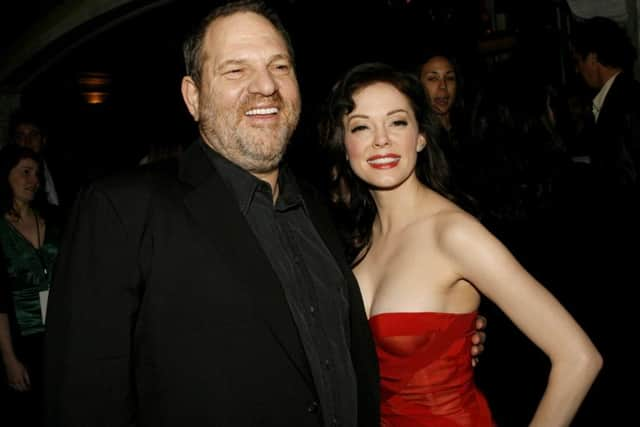

She doesn’t name him in her book, she’s taken back control and won’t have “The Monster’s” name in it – today she calls him “that warthog from hell”. Of his refusal to acknowledge what she says happened, she says simply, “Of course. Which just makes you feel terrible. Every time his lawyers say ‘consensual’ it gives me a body flashback and makes me sick to my stomach, consensual my ass. Like I would ever let that warthog from hell touch me. I wish he would cease to exist. I just wish he was not on the planet anymore, just cease.”
Advertisement
Hide AdMcGowan had always spoken about the alleged attack privately, but her battle against Hollywood became public when she discovered the power of Twitter in 2015. After receiving a casting note for an audition for an Adam Sandler film that suggested she wear a form fitting top, push up bra and show some cleavage, she rolled her eyes, posted it on Twitter and went to bed. In the morning she woke up to an internet storm of support, calling out Hollywood’s sexism.
Did she think ‘oh brilliant’, or ‘oh no, what have I done?’
She laughs, “Kind of both. At first I thought ‘oh no’, then I thought actually that’s brilliant, then I thought ‘oh no’ again. It’s very strange when things go viral and you’re in people’s heads, on their phones, it’s powerful and weird and nice being on the other side of it.”
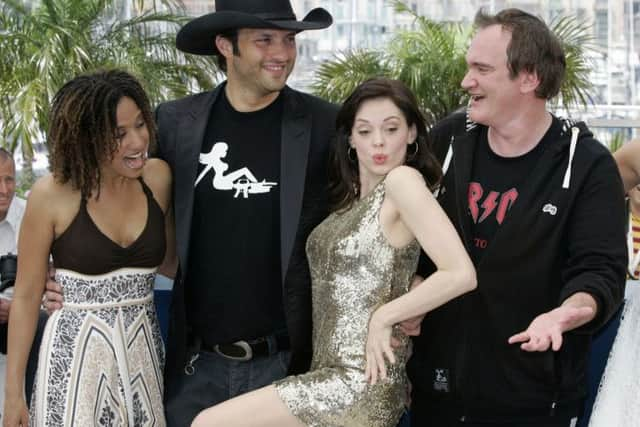

Advertisement
Hide AdSilenced in the world of Hollywood, the internet was an arena in which McGowan found her voice.
“There was no way to speak out if someone was controlling the media and dominating it. But they can’t control the internet, you have your freedom and your access route.”
So when Fox promoted the new X-Men film with an image of Jennifer Lawrence being strangled, she published online an open letter of objection, part of a backlash against the promotion that saw it withdrawn. Writing in her book she says, “I felt an obligation to be a voice for women, people who had suffered from violence.”
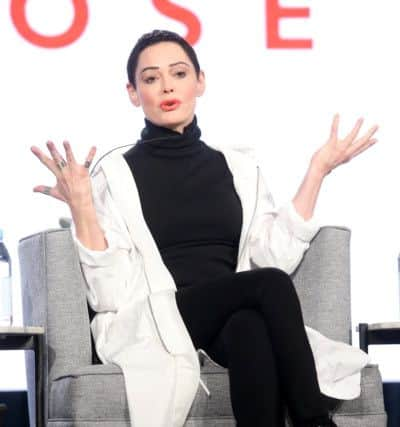

But why does McGowan think it’s on her to object, why does she have this strong sense of obligation?
“It sometimes feels like if I don’t, who else is going to? If not me, then who, and why not me? I have a special tool set. I’ve dealt with some of the big baddies and I’ve had a lot of hardship and I’ve battled through them and I’ve survived. And I know you can help others get to the other side.
Advertisement
Hide Ad“I’ve always had a thing for justice, I don’t know what it is, I just don’t like seeing misjustice and I certainly don’t like predators.”
McGowan spears Hollywood’s misogyny in Brave, pointing out that in 2016 only 23 per cent of speaking roles on screen were female, the majority in horror films. “And we know how they get treated,” she writes.
Advertisement
Hide AdFurther, The Directors Guild of America is 96 per cent male, and has been since 1946, which McGowan argues means that for your entire life you have been fed a steady diet of largely male thought and bias about women.
“Why is 96 per cent of our information, entertainment and philosophy coming from men?... Film and television is a white male’s playground and through their narrow vision comes the manipulated mirror you’re largely forced to see yourself in. If that’s not malewashing I don’t know what is.”
With an online following calling out sexism, when people started talking about harassment by Trump in 2016, McGowan didn’t hesitate to join #whywomendontreport (their sexual assault) debate.
“Trump helped elucidate what sexism and racism are, filled it out in big burning block letters and people went ‘oh, that’s what this is’. Thanks Trump!” She laughs.
McGowan says she is speaking up for people like her, the disenfranchised, the hurt, the lost, the lonely, the brave ones who choose to live their lives differently, see things differently and function in a society that doesn’t want them in their own way.
“The Rose Army is an army of thought,” she says. “We stand for freedom of spirit and mind. We stand for dissent. We stand for equality and the right to have our lives be unencumbered by proscribed thoughts and traditional mores.”
Advertisement
Hide AdMcGowan’s book festival appearance is tied to the theme of identity, and the idea of whether we choose our own identity or have one forced upon us.
“I grew up in a really unusual way that led me to have my own identity and not be co-opted,” she says, “and then later as an actor I played multiple identities so identity has always been a really interesting idea for me.”
Advertisement
Hide AdNow 44, it was growing up among the Children of God in rural Tuscany in the Seventies that McGowan first learnt to retreat into her own head, rejecting the rules of the cult. Then later after the family escaped and returned to America, she was bounced among relatives, but found solace in reading, identifying with the persona of each book’s protagonist, a harbinger of her later career.
“I used my training from books, absolutely, it’s the only acting training I’ve ever had,” she says.
If McGowan’s childhood reads as traumatic, she also manages to convey the pleasure she and the pack of cult children took in their Tuscan playground, the rows of marching cypresses and olive groves, despite often being hungry, confused and scared. And it was growing up in a cult that made her alert to the mechanics of control when she arrived in the US, then later in Hollywood.
“When I came out of the Children of God everybody was saying how weird it was, how I lived and grew up, and I just thought ‘well, it’s weird how you live, you’re living under the same kind of dictates, you’re just not aware of it’. Everything was the same except bigger and more diluted. I thought ‘if you think you’re free, you’re not’. I was really shocked to find how the same belief systems being utilised, but a more internalised version.”
After leaving home at 15, she headed to LA where she was discovered standing on a street corner and offered a part on a film, Paul Shore’s 1992 comedy Encino Man. To the hungry and homeless McGowan, it was a means of survival.
Advertisement
Hide Ad“I was a journeyman actor, it was not my love, it was just something I happened to be good at.”
Success followed with The Doom Generation and she made her breakthrough in horror flick Scream, then headlined in Going All the Way, Devil in the Flesh and Jawbreaker, yet by the end of the 1990s, according to McGowan because she was being sidelined, the big film roles had dried up.
Advertisement
Hide AdSwitching to TV she was a lead in supernatural series Charmed from 2001-6, then in a return to film starred in Robert Rodriguez and Quentin Tarantino’s double-feature film Grindhouse in 2007. Parts in Fifty Dead Men Walking, Conan and other films followed then in 2014 she realised an ambition and made her directorial debut with the critically acclaimed short film Dawn, which premiered at the 2014 Sundance Film Festival.
Since Dawn McGowan’s time has been taken up with Brave and the creation of a multimedia album, Planet 9, released in January at the same time as the book.
“I’m really excited about performing it at my first music festival in Norway in November,” she says. “Planet 9 is kind of the other side of the book, where you go once your brain has been changed. It’s a place I invented, then astronomers found a Planet 9 four years ago – I almost fell off my chair! So I started writing songs for this place, and music. It’s my sanity. My art projects are what has kept me sane, that and my therapy.”
McGowan is also writing a second book, on the subject of trust, a behind the scenes story of her life as she set about telling her story, a time in which she says ex-Mossad agents hired by Weinstein to quash misconduct allegations, followed her.
“What is trust, how do we do it? I had to learn how to trust, otherwise you’re never going to trust anybody again in your entire life.”
Given her experiences, how many people does she trust in her life now?
Advertisement
Hide Ad“I trust about seven people,” she says, “and then the rest of the world, I hope,” she laughs.
Seven’s quite a lot, I tell her.
“Yeah, I’m doing pretty good,” she laughs and reconsiders. “Maybe it’s about three or four.”
Advertisement
Hide AdFighting the Hollywood machine would deplete your faith in human nature, not to mention your resources. Ask McGowan where she lives now, and she comes straight back with “Nowhere.
“I don’t have a house. I sold it to pay legal bills, so now I just travel. I live in hotels, airbnbs, on friends’ couches. Fighting the machine is not cheap, and they’re trying to bankrupt me.”
Another front in McGowan’s fight against misogyny comes in the shape of the face cream she has developed with her aunt. It sounds unlikely at first, why is she dabbling in face cream? Yet as she talks you see her logic.
“I want to disrupt the beauty industry,” she says. This is the woman who back in 2015 cut off her “long, glossy Kardashian-esque hair. I thought I looked more like a blow-up sex doll… I had been turned into the ultimate fantasy f*** toy by the Hollywood machine. I was dying on the inside and embarrassed by what I looked like on the outside.” And shorn of her hair, the real McGowan came out fighting.
“And everyone complains about unrealistic beauty standards, but nobody really looks at it from a class point of view. I think it’s deeply classist, that if you don’t want chemicals you have to pay $150. It’s all part of the bigger scheme, of the way they keep women down. You pay them less and charge them more.
Advertisement
Hide Ad“I’ve found an amazing laboratory that’s not connected to the expensive companies, to make an amazing product, that’s natural, and unisex.”
And because this is McGowan
we’re talking about, it’s not just dewy skin she’s after, there’s a bigger goal.
Advertisement
Hide Ad“Ten per cent of the income is going to a centre which will provide long-term care for victims of violence, and I want some day to start a spa staffed by domestic violence and human trafficking victims. When people’s finances and self-esteem have been torn apart, they have no idea how to operate in the world but we can set them up so they can train others. So it becomes kind of like a school, that’s the company I’m building,” she says.
“I hope to keep changing the world and do good for others. And make great art.”
And when she sees the lengths people have gone to to try and shut her up…
...“they’re still going,” she says.
But she’s still going too...
“Yep.”
...does she ever feel overwhelmed?
“Sometimes I get overwhelmed... a little. But the only way to change things is to lift the blanket and shine a light on the darkness. My goal is to expose Hollywood for what it really is. I have a million more stories I could tell in this book, but I don’t have the energy to document all of the dickery.” She laughs, exasperated, but determined. “In the book I say I’m like a phoenix and with this book, I rose again.”
• Rose McGowan with Afua Hirsch is at the Edinburgh International Book Festival on Monday, Baillie Gifford Main Theatre, 3:15pm, £12, (£10). For tickets see www.edbookfest.co.uk
• Brave by Rose McGowan is published by Harper Collins at £20.